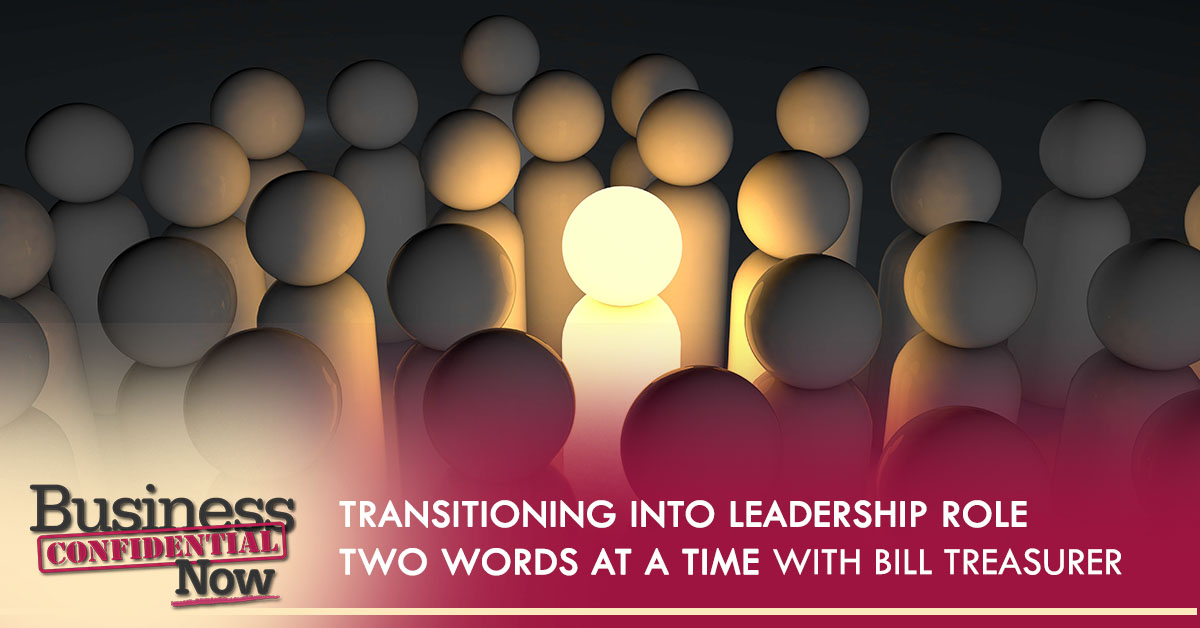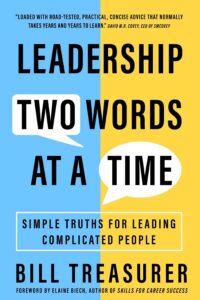
Transitioning into leadership roles can be exciting and challenging. Bill Treasurer, Chief Encouragement Officer at Giant Leap Consulting, Inc., offers advice on how to successfully navigate the changes.
What You’ll Discover About Transitioning Into Leadership Role:
- Why transitioning into leadership roles is about the team.
- How a mentor can make transitioning into leadership roles smoother.
- How to develop more influence when transitioning into leadership roles.
- Why listening is such an important skill to cultivate when transitioning into leadership roles.
- How to save your sanity by transitioning into a leadership role “two words at a time.”
About Bill Treasurer
 Bill Treasurer founded Giant Leap Consulting in 2002 and has worked with thousands of leaders in the U.S. and beyond, including NASA, eBay, Lenovo, UBS Bank, Saks Fifth Avenue, and many more.
Bill Treasurer founded Giant Leap Consulting in 2002 and has worked with thousands of leaders in the U.S. and beyond, including NASA, eBay, Lenovo, UBS Bank, Saks Fifth Avenue, and many more.
He also has a new book, Leadership Two Words at a Time: Simple Truths for Leading Complicated People, which provides actionable and relevant advice to today’s emerging leaders.
Related Resources:
http://www.GiantLeapConsulting.com/2Words
http://facebook.com/bill.treasurer
http://www.linkedin.com/in/courage
https://www.youtube.com/channel/UCqXG09VKk-au-YpCZFw-1SQ?view_as=subscriber
If you liked this interview you might also like these Leadership and Management episodes.
—
Transitioning Into Leadership Roles Two Words At A Time With Bill Treasurer
I’m excited to welcome Bill Treasurer to the show. Bill is the Founder of Giant Leap Consulting, where he has worked with thousands of leaders in the US and beyond, including NASA, eBay, Lenovo, and Saks Fifth Avenue. Bill is also the author of Leadership Two Words At A Time, Simple Truths for Leading Complicated People in which he provides actionable and relevant advice to today’s emerging leaders. I’m sure we could all benefit from some of that advice. Welcome to the show, Bill.
Hanna, it’s my pleasure to be with you on Business Confidential Now. I’m looking forward to our time together.
Me too because transitioning into leadership is something many people aspire to. It’s the brass ring. There’s usually higher pay and benefits, as well as more positional power, status. I’m curious, in your experience, what’s the biggest surprise emerging leaders encounter when they’re transitioning into leadership?
It’s definitely a noticeable transition. There’s this moment before you get into a leadership role where you’re aspiring, you’re climbing, you’re trying to do the next right thing. Maybe you get noticed and then that happens. Some people above you, probably a boss, says, “That person gives us a great output. They’re productive and conscientious. Let’s move them into a leadership role.” Then you get into the leadership role and you start to realize, “This is not what I thought it was going to be.” There is this moment where the honeymoon is over. It doesn’t happen right away, but it’s going to happen probably in the first 3 to 6 months, where you get the reality that it’s a lot harder than you thought.
One of the things that makes it so hard is, “I know what I was doing operationally. I have the technical proficiency. It’s one of the reasons you moved me in here is my subject matter expertise, but you didn’t tell me I was going to have to be a psychiatrist and I was going to have to deal with all sorts of these petty idiosyncrasies on a daily basis.” Part of it is that we get frustrated with the reality of what I signed up for and what I actually have to do now, which are two different things.
You call them petty idiosyncrasies, but if those are stumbling blocks and speed bumps, then it sounds like they’re more than petty. They’re pretty important.
They are. What happens is a lot of times we move into that role as a leader because we were operationally really good at something. We had a lot of productivity by ourselves. As an individual contributor, we get notice, but once we move into a leadership role, it’s no longer about our own contribution. It’s no longer about us.
In fact, the first rule of leadership, I would say, is that it’s not about you. It’s about the people that you’re leading. How I get the most out of the people that are leading is not just operational and technical proficiency. It is about motivation. It is about creating psychological safety. It is about my treatment of them so that they’re loyal and that they want to do the work. It is making sure I give people individual attention. These kinds of things they don’t tell leaders as they’re moving into a leadership role because nobody hands them a playbook. We’re left to flounder. Eventually, maybe we get some mentoring along the way. Maybe if you’re really lucky, your company has a leadership development program, but most people have to grope their way through the process.
The first rule of leadership is that it’s not about you, it’s about the people that you’re leading. Click To Tweet
Groping is not something leaders should do, especially not in this day and age. You know that. Let’s not go there, Bill. I understand what you’re saying about, “How do I get people to move the ball? I know how to do it, that’s why I got promoted. I was damn good at it, but now I’m herding cats in a way,” and that’s not the easiest thing. I understand that there’s not that much guidance necessarily. Somewhere, I saw it maybe in the materials you sent me that 83% of organizations say it’s important to develop leaders, but only 5% have any plans to do so. Why do you think that is?
I think for a lot of companies, it’s just simply dollars and cents, that they would like to devote their financial resources to other things. Even though you and I know developing your people is a supremely important thing. That said, if your company doesn’t provide leadership development, don’t resign your yourself to that. You still have an obligation to yourself. You should want to invest in yourself. If nothing else, the cheapest thing you could do is find a leader that you admire, and go and sit down with them over lunch or breakfast, and pepper them with questions. Ask them for their guidance. Most people are flattered when you do that. If your company doesn’t provide leadership development, don’t use that as an excuse for a poor leadership. You should be investing in yourself in whatever ways that you can.

Transitioning Into Leadership Role: If your company doesn’t provide leadership development, don’t use that as an excuse for poor leadership. Find a leader that you admire and go sit down with them. Start investing in yourself.
That’s good advice. Let’s say I’m transitioning into leadership, and I have hit this fog that you’re talking about. It’s like, “People are coming to me. They have these issues. I’ve got to deal with this.” This isn’t substantive. This is not the area of expertise. There’s this other stuff. There are leaders that I admire. Let’s say I’m lucky enough to be able to get a meetup. What should I be asking them?
One of the first questions I would ask is, “Tell me about your own leadership journey. Think back to when you started in a leadership role and shifted from an individual contributor to now being responsible for a team of people. What was the transition like for you? What did you get wrong that you wish you could do a do over and do it differently? What guidance would you give me knowing that I’m facing that same transition now? What should I be aware of as I go through my own leadership journey that you think are essential to being successful in a leadership role?” Some basic questions, and also I would get that person’s point of view, “What does it even mean to be a leader? How do they define leader? What do they see as the essentials of being a leader?”
One of the things that I try to talk about in the book is that to be fit to lead, it comes down to leadership fitness, and that you’ve got to cover three bases. You could ask that mentor in these three different areas. The first is you’ve got to lead yourself. You’ve got to be somebody who’s disciplined, who manages time well, who knows how to prioritize, who is self-evaluative, who is clear about what their strengths are and the overuse of their strengths. You’ve got to lead yourself. That’s one area.
The second area is you’ve got to lead people. That’s different than leading yourself. It is about making individual time. It is about setting goals with them and making sure they’re stretching to an elevated level of performance. It is about your treatment of them and creating a healthy work environment. Leading people, that’s the second area.
The third area is you’ve got to get work done. Leading work, you’ve got to get results. That means being aware of the schedule, being aware of the budget, being aware of all the levers of business that make or lose money. That gives us leadership fitness. If we are attending to, “Am I leading myself? Am I leading others? Am I leading work?” I would ask questions for that mentor around those three areas of leadership fitness.
Of those three areas, where do you think people fall down the most?
It’s a good question, Hanna. I see two realms. One is that some people fixate on results so much that that’s their preoccupation. All they know is personal productivity or, “I’ve got to get that deadline done. I’ve got to bring in that project in stellar form. I’m going to be the bulldozer, and if you’re not part of the bulldozer, you’re part of the pavement. I’m fixated, only my preoccupation is results.”
Emerging leaders fail because they are so fixated on results, so much that that’s their preoccupation. Click To Tweet
Leaders are judged based on, “Do they get results?” I understand the fixation, but for that particular person, they don’t spend enough time bringing people along with them, so they cause a lot of human wreckage. Eventually, it will take a toll and eventually that leader won’t be successful because they don’t bring people with them. Eventually, they maybe even have the mistreatment of people in order to get that result that they’re so fixated on.
On the other hand, that’s like one group of people. The other neglected part is the self-evaluation. A lot of leaders are just like a lot of human beings, don’t know thy self. It’s the first chapter in my book. A lot of leaders are oblivious to themselves. If you don’t know who you are, you don’t know your own motivations for even wanting to be in a leadership role, don’t know what your strengths are, and don’t know what your shadow is, the overuse of your strengths, then why would you be in any position to lead other people? You don’t even know yourself. I think it’s either one or the other that we get fixated on results to the mistreatment of people, or we’re just an oblivious human being, not knowing our own motives and knowing our strengths and limitations. That gets in the way of our leadership too.
One of the things you mentioned before that someone could ask a leader that they admire is what they think leadership is. Let me ask you because I know you’ve made the transition. What does leadership mean to you?
A couple of things. The most simple definition of leadership is someone with followers. I don’t want to suggest that you have to have direct reports to be followers because although that is a simple definition of leadership, the most common word in all the definitions of leadership that you’ll come across is the word influence. Are you bringing your own personal agency into a situation to be a source, a positive force, a positive influence on others, on results, on the work getting done?
Are you using your influence? That doesn’t mean that it’s under your direct control or your direct command. Sometimes, your influence is that you have the ear of the person who makes the decisions, or they solicit your input and you’re able to influence the decision that they make or the action that they take. I think influence is really important to leadership.
The other maybe simpler way of looking at leadership is I think there’s a gap with pretty much every human being between the person that we are and the person that we are aspiring to be. I think a leader is our most noble self. It’s our better self that we’re trying to bring into the world so we can make a positive difference.

Transitioning Into Leadership Role: There’s a gap between who you are and who you are aspiring to be. Being a leader is your most noble self. It’s your better self that you’re trying to bring into the world to make a difference.
On any given day, I think leaders are conscious of that gap about who they’re trying to be in the world, and are aspiring to be the best that they can be, so they draw out the best in others. Personal agency, influence, aspiring to be your best, a forward look to the future, trying to make things better in the world, trying to make a positive difference. I think those things and getting results through yourself, but through other people too. Bringing people along with you so that they feel part of something bigger than themselves, and they feel a sense of purpose in the work that they’re doing. Those would be some of the things that I would include in leadership.
Those are all excellent points. It sounds like leadership is a really tall order, not just for the items that you just mentioned, but what we mentioned about being fit to lead, really knowing yourself. It sounds like some people fall into the gap with the Imposter syndrome. Being able to lead people making that connection, and still being aware of the need for results but without micromanaging those results. That seems like overwhelming. When somebody’s transitioning into that leadership role, how do they keep from getting overwhelmed?
It’s a such a central and important question. To frame it, I’ll tell you that I was working with a group of people one time in a Chicago-based company that I work with. It’s a $6 billion company. The CEO of the company was in front of this group of about 30 leaders, high potential, on their way, new leaders. One person in the room asked him, “What is something that we may not appreciate about leadership, but you know because of your position as the owner of the company?” He was quiet for a second and he said, “That leadership is a burden.” That’s what he said, “That leadership is a heavy responsibility.”
When he looks out at the parking lot and sees the cars there, he realizes that he’s paying for kids’ educations and their colleges and the car payments themselves and feeding people’s dinner tables. He feels a personal obligation and responsibility to that. You and I talked about all the things that we want of a leader in the transition and how difficult it is. We want leaders to be strategic, tactical, inclusive, and emotionally intelligent and regular intelligent. It can be overwhelming.
To your point, this is part of the reason that I wrote Leadership Two Words at a Time because I think if you get past the clutter, don’t allow yourself to get overwhelmed by all the things that we expect of leaders and all the obligations that it can weigh you down. My suggestion is to take leadership two words at a time, whatever the next two words are that are right in front of you so that you can do the next right thing. Sometimes you’re having to gain composure. That might be two words that are right in front of you.
Take leadership two words at a time. Don’t get overwhelmed by what is expected of you as a leader. Click To Tweet
I had one leader one time that was working on calm confidence. I had a leader who was out of balance that started working on personal fidelity. What are the two words right in front of you right now? Self-care is something you might need to work on. Break down leadership. Instead of thinking the large gigantic volume of everything you’ve got to do as a leader, think about what is the next right thing right in front of me, and if I could just clarify it in two words? That’s what my book does with every chapter, but you could do it yourself. Any leader could do it themselves, “What are the two words that I should focus on right in this moment?”
What are your favorite two words?
One of the two-word chapters in the book that I haven’t ever written about before, but I felt was important is Cultivate Composure. That is, how do you start your day? Do you just jump right into all the interruptions? On the way to work, are you listening to anger entertainment on the radio? Do you jump right into the first meeting and go onto the next one without any time in between? Are you caught up in this whirlwind treadmill? Or do you ease your way into your day? How do you start your day? I suggest starting with just five moments of actual silence.
I love Benjamin Franklin’s two questions. The first question in the beginning of the day, “What good shall I do in the world today?” Think about that in the morning before you go to work. At the end of the day, when you’re hitting the bed, say, “What good have I done in the world today?” Bookend your day with the Benjamin Franklin questions. That’s one of the chapters, Cultivate Composure.
Another one that I think is important is practice humility. We want confidence in a leader, but we don’t want conceit and arrogance. We want to make sure that that confidence is grounded and anchored and centered on humility. That leader hasn’t lost sight of their roots, that they can look at me in the eye, and more than anything, that they will value my contribution. They will actually listen to me and solicit my ideas. It’s a demonstration of humility, just listening. Those are just a couple of the two-word concepts that, to me, mean a lot. Cultivate composure, ease your way into your day, and practice humility by the treatment that you give other people mostly through your full presence and attention and listening.
Listening is so important. It is probably one of the highest compliments that you can give someone, to give them your full attention, to try and understand and learn where they’re coming from, not just listen for the purpose of, “How can I interrupt now and tell them they’re wrong?”
You bring such a great point. It’s such a simple way of valuing somebody. It doesn’t cost you anything. It takes your attention, but you give somebody your full presence. You’re communicating to them that I value you and what you have to say. When that person feels valued, they know that you care about them, and then they’ll be a lot more loyal to you.
The thing is, people are so rushed for time. I’d like to come back to something that we talked about very early in our conversation, and that is about budgets. We focused most of this about what individuals can do when they’re faced with transitioning into leadership, and how they can grab the bull by the horns and do their own leadership development. Maybe a little ad hoc, but still, how can they improve and fill those big shoes that they’ve been given?
What about the organizations that may be small but say, “I know and understand the importance of leadership development. I’m an entrepreneur. I need to be developing my people. To free up more of my time to be able to expand the business, I need to start developing more of that middle layer. How can I take steps to develop their leadership skills that could be budget-friendly, small steps. I may not address everything across the board, but where can I start?”
Most businesses in the United States, and probably in the world, are small businesses. Not everybody can afford a full-on leadership development program. Starting small, here are a couple of ways that you could do that. First, you could start a little book club in your office. Let’s imagine you’ve got ten people in your office. Get a leadership book. If you can buy a copy for everybody, all the better. Everybody reads the book. Then we process the book together and answer questions, “What did we like? What resonated? What takeaways did we get?” It’s a simple thing we could do.
Another thing that we could do is simply a lunch and learn. We could gather around the table at lunch, and one of us could give a brief presentation, 15, 20 minutes about some central topic that’s important to them that connects to leadership. Then, all of us dialogue about it. It doesn’t have to be on PowerPoints. It can simply be an index card with bullet points that you have of notes that you’d like to share with them, and then rotate that. Next week, somebody else does it. A little lunch and learn.
The third thing you could do is as a business owner, you don’t have to be the hero. You don’t have to be the one bringing the sunshine all the time. If you’ve got somebody that you’re connected to in your neighborhood, in your locality, a friend of yours in the business community who has a different take on leadership, and invite them to come in and meet with your group for 45 minutes to have a special guest star from the local community come in. These things are all inexpensive.
At the very least, the simplest thing you could do is have a conversation with your team. Maybe buy a flip chart from your local Staples or Office Depot, and say, “What does leadership mean to you? When you hear the word leadership, what does it mean to all of you?” They start brainstorming about the idea of leadership, and what do you think we should do to build our leadership around here and get their involvement. There are all sorts of inexpensive stuff. The only thing that we talked about there that would cost money is maybe a flip chart or maybe a buying a book. Besides that, you could do a lot of things for no money at all.
That’s great advice, Bill. I really appreciate that. Thank you so much for all of this information that you’ve shared, and the important work you do in helping organizations with their leadership development needs. Because it happens on all different levels, and as you said, it is attainable even for the smallest organization. What I really liked about these tips that you focused on that were budget friendly is not only do the employees learn about leadership and have an opportunity to share their perspective, but it gives the entrepreneur and the manager or executive a chance to develop their leadership more by discovering what’s important to their people. I think it’s a plus all the way around.
Thank you so much for reading. Be sure to tell your friends about the show. Leave a positive review. We’ll be back next time with another episode of Business Confidential Now. Until then, have a great day and an even better tomorrow.
Join, Rate and Review:
Rating and reviewing the show helps us grow our audience and allows us to bring you more of the rich information you need to succeed from our high powered guests. Leave a review at Lovethepodcast.com/BusinessConfidential
Joining the Business Confidential Now family is easy and lets you have instant access to the latest tactics, strategies and tips to make your business more successful.
Follow on your favorite podcast app here as well as on Twitter, Facebook, YouTube, and LinkedIn.
Download ♥ Follow ♥ Listen ♥ Learn ♥ Share ♥ Review ♥ Comment ♥ Enjoy
Ask Questions or Recommend a Topic/ Guest:
- Use our convenient Get in Touch form
- OR e-mail feedback(at)BusinessConfidentialRadio.com
Disclosure:
This post may contain links to products to products on Amazon.com with which I have an affiliate relationship. I may receive commissions or bonuses from your actions on such links, AT NO ADDITIONAL COST TO YOU.

